Seagate Momentus XT Hybrid Drive Tested: 750GB at Near-SSD Speeds
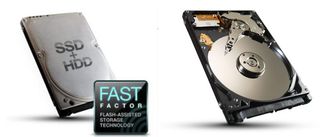
Last year, Seagate threw the storage world a curve when it released the original Momentus XT, a 7,200-rpm 250 or 500GB hard drive with the ability to cache your most commonly used files on its 4GB of Flash memory for faster app opens, boots, and other frequent reads. Today, the company announced its next-gen Momentus XT, which ups the capacity to 750GB, the flash memory to 8GB, and the interface to SATA 6Gb/s, all while promising even more intelligent caching.
But is the new 2011-era Momentus XT worth its $245 MSRP, when you can buy a regular 750GB, 7,200-rpm drive for $149 or a 128GB SSD for around $200? To find out, we ran the new drive through a few tests and then compared the results to those of a Samsung 830 Series SSD (256GB) and a standard 7,200-rpm 500GB hard drive. All tests were conducted on an HP dv7t notebook with a quad-core Core i7 CPU and 8GB of RAM.
Learning Curve
Using a process Seagate calls "Adaptive Memory," the Momentus XT's firmware is designed to learn from your habits, seamlessly storing the files you access most on its 8GB of flash memory. This means that the first time you open a program or a data file, you won't see the benefit of the flash memory at all. However, the second time you access a piece of data, you will see dramatic improvement.
Seagate says that load times continue to improve through the fourth and fifth access. However, on our app-open tests, the times improved dramatically on the second iteration but not afterwards. That's just fine with us, because we're happy to get the fastest possible speed on our second try. For example, opening Excel 2010 to a large spreadsheet took 59.4 seconds on first access, but only 5.4 seconds on second access. Subsequent accesses were either the same time or up to 1.2 seconds slower.
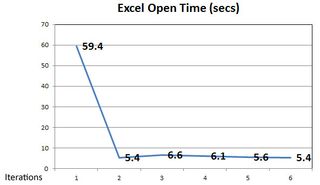
Single App Opens
To see just how quickly the second-gen Momentus XT can open applications, we timed it opening four programs. We performed the app opens six times on the Momentus XT, rebooting between each iteration, and took the average of the last five opens. The applications were:
Stay in the know with Laptop Mag
Get our in-depth reviews, helpful tips, great deals, and the biggest news stories delivered to your inbox.
- Adobe Reader X opening to a 500-page document
- Excel 2010 opening to a 6.5MB spreadsheet filled with 65,000 names and addresses
- Firefox 7 opening to a blank page
- Word 2010 opening to a blank document
The table below shows both the first iteration and the average of the final five. It also shows how long the Samsung 830 Series SSD and the 500GB 7,200-rpm hard drive took. All times are in seconds.
| Application | Momentus XT (1st iteration) | Momentus XT (2-6 iteration average) | Samsung 830 Series | 7,200 rpm hdd |
| Adobe Reader | 14.2 | 4.6 | 3.8 | 7.1 |
| Excel | 59.4 | 5.8 | 4.2 | 14 |
| Firefox | 3 | 1.2 | 1.1 | 3.2 |
| Word | 2.4 | 1.7 | 0.8 | 2.8 |
As you can see, the Momentus XT is dramatically faster than a standard 7,200 rpm hard drive when opening an app from the second time on. However, for some reason, we noticed that Adobe Reader and Excel 2010 were actually a bit slower on the first open than they were on the plain 7,200-rpm hard drive. Perhaps this is just a coincidence.
App Opens Under Stress
To see how the Momentus XT handles multitasking, we performed the same app open tests while zipping files in the background. We found that the drive did not usually improve from one iteration to the next (Excel going from iteration 1 to iteration 2 is an exception) and that times actually varied wildly from one open to another on the two larger applications, Adobe Reader and Excel.
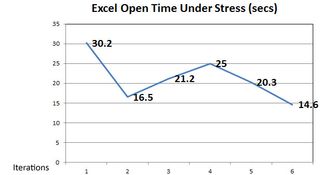
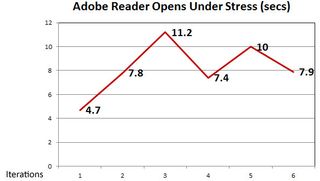
Considering that we had run six iterations of the single open test before we did the multitasking stress test, it's likely that all four applications were already completely cached, which is why the first iteration was not necessarily worse than the second or the sixth.
| Application | Momentus XT (5 iteration average) | Samsung 830 Series | 7,200 rpm hdd |
| Adobe Reader | 8.2 | 4.7 | 92.8 |
| Excel | 22.6 | 6.7 | 22.6 |
| Firefox | 1.6 | 1.7 | 4.3 |
| Word | 1.6 | 0.8 | 2.8 |
The Momentus XT proved a lot faster under stress than the 7,200-rpm hard drive, but it just couldn't match the SSD. Considering that we were zipping 4.97GB of files in the background and the Flash memory itself is only 8GB, there just might not be enough space to really optimize our zip operation.
File Copies
In our testing, the Seagate Momentus XT's adaptive memory did not help speed large file copies. In three iterations of both a single large 3.1GB file copy and a 4.97GB multiple file copy, we did not see any improvement from one copy attempt to the next.
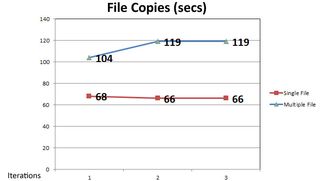
How do these file copy times compare to those of the SSD or the plain 7,200-rpm hard drive? We took the 3-time average of all three drives to find out. Times below are in seconds.
| Copy Test | Momentus XT | Samsung 830 Series | 7,200 rpm hdd |
| Single File Copy | 66.7 | 13 | 71.7 |
| Multi-File Copy | 114 | 25.3 | 137 |
The Seagate Momentus XT copied files just a little bit faster than the plain 7,200-rpm hard drive, but it was nowhere near as quick as the SSD. If you plan to do a lot of large file operations and need those to be their fastest, you must get an SSD.
Boot Times
Seagate reserved a special section of the Momentus XT's flash memory just for holding Windows boot files. Using this "Fast Boot" technology, the company promises start times that are 3 times faster than a normal hard drive. We put that claim to the test by using a stop watch to time three boots from each of our drives. To make sure it had time to learn our notebook's boot process, we only timed the Momentus XT after we had booted it more than a dozen times.
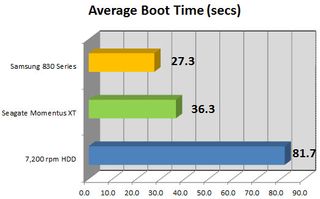
While not as fast as our SSD, the Seagate Momentus XT booted more than twice as fast as the standard 7,200-rpm hard drive. Going from nearly 1.5 minutes to just over 30 seconds is nothing to sneeze at.
Value
At $245 MSRP, the Seagate Momentus XT costs only $0.33 per GB, much less than even the least expensive SSD. The Samsung 830 series, the fastest SSD we've tested, currently costs $209 for 128GB ($1.63 per GB), $389 for 256GB ($1.51 per GB), and a whopping $849 for 512GB ($1.65 per GB).
A standard 7,200-rpm hard drive with 750GB capacity costs $149 or just $0.19 per GB. Considering the added speed, the Momentus XT is definitely worth the additional cost per GB.
Verdict
If you want the fastest performance possible, then a full-fledged SSD such as the Samsung 830 Series ($209 for 128GB) is still the way to go. However, if you need more a drive with a lot more than 128GB of storage and can't afford to mortgage the farm for a 256GB or larger SSD, the Seagate Momentus XT is your best upgrade option. Seagate also says that some OEMs will also be offering the drive as an option on their notebooks, which makes the Momentus XT a great configuration option when you buy from vendors such as Dell and Lenovo, which custom build your system.
The second-generation Momentus XT provides application / file opens and boots that are significantly faster than those of a 7,200 rpm hard drive and only a little bit slower than an SSD. Considering that app opens and boots are the most important drive operations, the Momentus XT is well worth its asking price.

